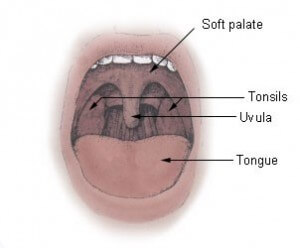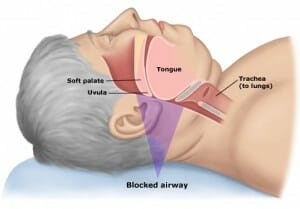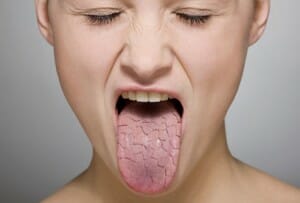Your dentist may have recommended an oral appliance (also known as a mouthpiece) to treat your snoring or perhaps you just watched a TV infomercial selling some type of stop snoring contraption. One way or another you have heard that treating the common problem of snoring could be as simple as placing a specially designed mouthguard into your mouth before going to bed. Is it really that simple? We all know that every product has its pros and cons and these anti-snoring devices are no exception.
Pros associated with using a mouthpiece for snoring
They work!
 After mentioning any anti-snoring device the first question that most people naturally ask is “Does it actually work?”. The short answer is “yes” Many of these mouthpieces are in fact an effective means to treat snoring. More specifically, they treat common snoring in the majority of cases. For most, the source of snoring originates at the back of the throat in the area between the soft palate and the airway. The soft palate is the soft tissue from which the uvula hangs. The uvula is the single finger-like flap of tissue dangling at the back of your throat. This area of the throat is actually a muscle which functions as an open and close valve between the mouth and nasal cavity. Whenever you swallow or sneeze, the soft palate closes and then reopens. This muscle tends to relax as we sleep and often partially blocks the air passage while flopping around. The vibration of these tissues against each other is where the sound of snoring typically comes from. There are a number of reasons why these muscles relax enough to cause a restriction in the airway. Listed below are a few contributing factors which lead to a loose soft palate.
After mentioning any anti-snoring device the first question that most people naturally ask is “Does it actually work?”. The short answer is “yes” Many of these mouthpieces are in fact an effective means to treat snoring. More specifically, they treat common snoring in the majority of cases. For most, the source of snoring originates at the back of the throat in the area between the soft palate and the airway. The soft palate is the soft tissue from which the uvula hangs. The uvula is the single finger-like flap of tissue dangling at the back of your throat. This area of the throat is actually a muscle which functions as an open and close valve between the mouth and nasal cavity. Whenever you swallow or sneeze, the soft palate closes and then reopens. This muscle tends to relax as we sleep and often partially blocks the air passage while flopping around. The vibration of these tissues against each other is where the sound of snoring typically comes from. There are a number of reasons why these muscles relax enough to cause a restriction in the airway. Listed below are a few contributing factors which lead to a loose soft palate.
- Age
- Weight
- Alcohol use
- Drug and sedative use
- Smoking
- Sleep posture
 In the majority of cases, this area of the throat is the culprit and a mouthpiece may be the solution. This type of device actually tightens these muscle by holding the lower jaw slightly forward as you sleep thereby preventing the soft palate from flapping around. How can you tell if holding the lower jaw forward will stop your snoring? Try this now (unless you’re surrounded by coworkers). Imagine yourself sound asleep and snoring loudly. Try to replicate the sound of snoring out loud. Continue doing this while using your muscles to push your lower jaw out as far as you can stretch it. Does the sound of snoring become more subtle or stop? If so then your soft palate may be the source of your snoring and a mouthpiece just may the solution. In other cases, factors such as enlarged tonsils, a deviated septum, physical obstruction, or simply the anatomy of your airway are to blame. The mouthpiece is not effective if these less common factors are causing your snoring.
In the majority of cases, this area of the throat is the culprit and a mouthpiece may be the solution. This type of device actually tightens these muscle by holding the lower jaw slightly forward as you sleep thereby preventing the soft palate from flapping around. How can you tell if holding the lower jaw forward will stop your snoring? Try this now (unless you’re surrounded by coworkers). Imagine yourself sound asleep and snoring loudly. Try to replicate the sound of snoring out loud. Continue doing this while using your muscles to push your lower jaw out as far as you can stretch it. Does the sound of snoring become more subtle or stop? If so then your soft palate may be the source of your snoring and a mouthpiece just may the solution. In other cases, factors such as enlarged tonsils, a deviated septum, physical obstruction, or simply the anatomy of your airway are to blame. The mouthpiece is not effective if these less common factors are causing your snoring.
Relatively safe
 Comparatively speaking, when used properly a mouthguard for snoring is an effective and safe anti-snoring solution. It does not involve any risky medical procedures and has been used to treat snoring and obstructive sleep apnea for over 30 years now. Since the introduction of oral appliances back in the early 1980’s, numerous studies have been conducted which show very few issues as far as safety. Having surgery performed is certainly riskier and there is, of course, the chance that it may not even be an effective solution. Personally, I would rather choose a treatment that does not involve altering surgeries unless absolutely necessary.
Comparatively speaking, when used properly a mouthguard for snoring is an effective and safe anti-snoring solution. It does not involve any risky medical procedures and has been used to treat snoring and obstructive sleep apnea for over 30 years now. Since the introduction of oral appliances back in the early 1980’s, numerous studies have been conducted which show very few issues as far as safety. Having surgery performed is certainly riskier and there is, of course, the chance that it may not even be an effective solution. Personally, I would rather choose a treatment that does not involve altering surgeries unless absolutely necessary.
An inexpensive solution
 There are various snoring treatment options available, some are more expensive and require surgery while others are fairly inexpensive and require no surgery. While professionally fitted custom devices can cost over $1500, most simple at home do-it-yourself boil and bite products cost no more than $70. Better constructed devices which tend to be more reliable and last longer typically cost between $70 and $200. The more expensive models are generally more customizable, better built and often last longer. Most snorers purchase a less expensive device at first just to see if a mouthpiece will work and then move up to a more expensive one which offers a better fit. Either type of device will work. Here is a cost comparison of these mouthguard remedies to other possible snoring solution:
There are various snoring treatment options available, some are more expensive and require surgery while others are fairly inexpensive and require no surgery. While professionally fitted custom devices can cost over $1500, most simple at home do-it-yourself boil and bite products cost no more than $70. Better constructed devices which tend to be more reliable and last longer typically cost between $70 and $200. The more expensive models are generally more customizable, better built and often last longer. Most snorers purchase a less expensive device at first just to see if a mouthpiece will work and then move up to a more expensive one which offers a better fit. Either type of device will work. Here is a cost comparison of these mouthguard remedies to other possible snoring solution:
- Uvulopalatopharyngoplasty (UPPP): $5,500+
- The Pillar procedure: $1,500 – $2,200+
- Somnoplasty $2,000 – $3,000
- Laser-Assisted Uvuloplasty (LAUP): $1,500+
- Doctor fitted oral appliances: $500 – $1,500+
- OTC snoring mouthpieces: $40+
- Nose rings, nose cones, nasal strips, chin straps, throat sprays, herbal supplements, special pillows, etc: $10+
I grouped last set of snoring solutions together because they have one thing in common which is that they generally do not work. These simply do not address the most common cause of snoring, the soft palate, which is located at the back of the throat.
Cons of using an antisnoring device
Missing possible diagnosis
 While simple snoring is considered a harmless act in most instances, other times it is actually a symptom of a more serious underlying issue. There are numerous possibilities but the more common problem is Obstructive Sleep Apnea (OSA) which occurs when the airway becomes completely blocked off and you stop breathing for several seconds. This can happen dozens of times throughout the night, robbing your brain of much-needed oxygen. In some instances, a person with sleep apnea will wake up gasping for air several times during the night and not even recall these events in the morning when they wake up. It is estimated that more than 18 million Americans suffer from this condition and many cases are left undiagnosed. In some cases where OSA is mild to moderate, a mouthpiece can be used to treat this condition. However, one should never self-diagnose and treat this condition because a proper diagnosis can only be made by a qualified sleep medicine professional. Before you consider treating your snoring, it’s essential that you first speak with your doctor in order to rule out the possibility of a more serious condition.
While simple snoring is considered a harmless act in most instances, other times it is actually a symptom of a more serious underlying issue. There are numerous possibilities but the more common problem is Obstructive Sleep Apnea (OSA) which occurs when the airway becomes completely blocked off and you stop breathing for several seconds. This can happen dozens of times throughout the night, robbing your brain of much-needed oxygen. In some instances, a person with sleep apnea will wake up gasping for air several times during the night and not even recall these events in the morning when they wake up. It is estimated that more than 18 million Americans suffer from this condition and many cases are left undiagnosed. In some cases where OSA is mild to moderate, a mouthpiece can be used to treat this condition. However, one should never self-diagnose and treat this condition because a proper diagnosis can only be made by a qualified sleep medicine professional. Before you consider treating your snoring, it’s essential that you first speak with your doctor in order to rule out the possibility of a more serious condition.
Possibility of side effects
 As with any medical device, side effects are always a possibility. For the most part, side effects typically include dry mouth, hypersalivation, mild pain or discomfort in the jaw and teeth. In rare instances, one will suffer a change in occlusion or loss of teeth. This can happen when individuals who have unhealthy gums or teeth use one of the mouthpieces or when one uses a device incorrectly or for an unintended purpose. Since design will vary from one device to another, it’s very important to always read the warning labels and follow any advisories that are posted by the manufacturer.
As with any medical device, side effects are always a possibility. For the most part, side effects typically include dry mouth, hypersalivation, mild pain or discomfort in the jaw and teeth. In rare instances, one will suffer a change in occlusion or loss of teeth. This can happen when individuals who have unhealthy gums or teeth use one of the mouthpieces or when one uses a device incorrectly or for an unintended purpose. Since design will vary from one device to another, it’s very important to always read the warning labels and follow any advisories that are posted by the manufacturer.
It must be worn nightly
 Often times, people purchase an antisnoring device without first considering the fact that it must be worn nightly in order to keep the snoring away. While wearing one is usually not very difficult, the snorer must form the habit of wearing one. You must remember to install it at night and subsequently remove and clean it in the morning prior to storing. This commitment is often overlooked and as a result, the device may be used for a few days or few weeks before being permanently stored away. If you are planning to use one of these mouthguards, keep in mind that this is a long-term commitment and wearing one must become a habit.
Often times, people purchase an antisnoring device without first considering the fact that it must be worn nightly in order to keep the snoring away. While wearing one is usually not very difficult, the snorer must form the habit of wearing one. You must remember to install it at night and subsequently remove and clean it in the morning prior to storing. This commitment is often overlooked and as a result, the device may be used for a few days or few weeks before being permanently stored away. If you are planning to use one of these mouthguards, keep in mind that this is a long-term commitment and wearing one must become a habit.
Pros vs cons
Before choosing a product, it’s wise to weigh the pros against the cons. Overall, the pros of the mouthpiece option far outweigh the cons. Here are a few key points to remember:
- In most cases, snoring mouthguards are an effective, safe, and an inexpensive solution that has been proven to prevent snoring.
- Be sure to mention any snoring problem to your doctor who can then determine if the issue needs to be further investigated.
- Carefully read the manufactures instruction and look for advisories and possible side effects.
- Remember, using one of these devices is a small commitment. Are you willing to commit to a new daily habit?
Which mouthpiece should I buy?
The anti-snoring mouthpiece is one of the most highly effective stop snoring solutions available. With over 100 different products to choose from, deciding which one to buy can be challenging. As a snorer and product reviewer, I have tried many of these devices and created a list of recommended devices that will help to make this decision much easier.
Share This Post: